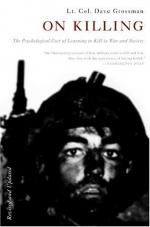
|
| Name: _________________________ | Period: ___________________ |
This test consists of 5 short answer questions, 10 short essay questions, and 1 (of 3) essay topics.
Short Answer Questions
1. According to Grossman in Chapter 7, how long can guilt over killing last?
2. In the Crimean War anecdote in Chapter 1, what do the soldiers do when confronted with an enemy at ten paces?
3. How many days can a soldier remain in combat before psychological trauma begins to manifest itself?
4. What reason is given in Bhagavad Gita to justify killing?
5. In Chapter 2, what is significant about the Civil War muskets examined by Grossman?
Short Essay Questions
1. How did military predictions regarding civilian bombings and psychiatric casualties prove completely wrong in World War II?
2. As described in Chapter 2, why are snipers given the cold shoulder in the military?
3. In Chapter 4, what philosophical and literary justifications for killing does Grossman cite?
4. How is the dissuasive potential of familiarity discussed in Chapter 4?
5. What assertion regarding military psychiatrists does Grossman make at the end of Chapter 8?
6. What surprising fact regarding soldier's fears in combat is revealed in Chapter 2?
7. What role does enemy morale play in the choice to kill?
8. As discussed in Chapter 3, what is the emotional advantage of hand grenades?
9. How does the Yale electroshock study connect with Grossman's thesis in Chapter 1?
10. Describe the Vietnam story of Chapter 4.
Essay Topics
Write an essay for ONE of the following topics:
Essay Topic 1
At one point in ON KILLING, Grossman describes the roots of fear and group bonding that can lead to an atrocity like the My Lai massacre. Write a three-part essay on the factors that lead to an atrocity in war, using My Lai as a framing device:
Part 1) How does fear of an unseen enemy make atrocities more likely in war? Discuss the way in which this creates emotional distance between noncombatants and soldiers. How does a catalyzing event, like an attack on the unit, further increase the likelihood of this sort of atrocity?
Part 2) What form of empowerment is felt in an atrocity? Discuss how the active and powerful decision to kill those whom one suspects of complicity in suffering can empower a soldier. What sort of possible catharsis can occur as a result?
Part 3) Discuss the group cohesion that can occur as a result of an atrocity? How does killing unarmed noncombatants bond a group of soldiers together? Conversely, discuss how the decision not to take part in an atrocity becomes dangerous as a result of this cohesion.
Essay Topic 2
Much of the last part of ON KILLING deals with comparing the way the military conditions soldiers and media conditions young people in America. Write an essay charting and analyzing this comparison. What are the means of traditional and conditioning in either arena? How do the authorities of the military training compare to those that young people in America listen to? What finer points does military training place on conditioning that the media in civilian life does not?
Essay Topic 3
Throughout the book, Grossman has argues that conditioning has been the key to increasing shooting rates in combat zones. It bypasses the conscious mind's inclination to avoid killing. Write a three-part essay analyzing the types of conditioning used in a military context:
Part 1) What is standard conditioning, and how is it connected to Pavlov's work with dogs? How does this type of conditioning manifest itself in military training? What specific defenses is it trying to overcome? What is its goal?
Part 2) What is operant conditioning, and how is it connected to Skinner's work with rats? To what extent is military operant training more subtly employed than traditional conditioning? How does this conditioning alter soldier behavior in chaotic combat?
Part 3) In military emulation of a role model, who is the standard soldier's role model? What does this role model represent to the soldier, and how does he wish to emulate him? What aspects of aggression and manhood does this affect?
|
This section contains 1,224 words (approx. 5 pages at 300 words per page) |

|




